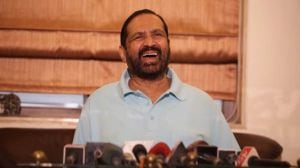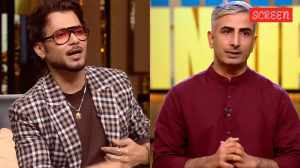Off the field exploits hog limelight as real action fades away
Sydney, September 11: With the Olympics still four days away, politics, gambling and scandal were attracting more attention than the inten...

Sydney, September 11: With the Olympics still four days away, politics, gambling and scandal were attracting more attention than the intense preparation of athletes for the Games.
Politics, never far away from the Olympics, made an early impact when the US basketball team were trapped in their Melbourne hotel by violent protests against an international business forum.
The team, considered unbeatable by the experts, were forced to train in the hotel and conference centre after about 1,500 protesters blockaded the complex to disrupt the World Economic Forum, which business personalities like Microsoft8217;s Bill Gates were set to attend.
At least eight people, including five police, were injured in clashes outside the complex, where the three-day Asia Pacific Forum, dubbed the 8220;Business Olympics8221; is being held.
In Sydney itself, the International Olympics Committee said no IOC members were among up to 40 people reported to have been allowed into Australia for the Games despite being on a list of 8220;undesirables8221; who would have been banned at other times.
The IOC has now backed away from a confrontation with Australia over the banning of two senior sports administrators from Uzbekistan and Hong Kong, accepting Canberra8217;s right to bar them for unspecified security reasons.
But a drug bust by Australian officials before the Games may have been a mistake.
Uzbek officials said an official of their Olympic team detained at Sydney airport for carrying banned drugs needed them for an illness and not to enhance team performance.
Uzbekistan National Olympic Committee Chief Sabirjan Ruziev said Sergei Voynov needed the muscle-building human growth hormone HgH for a skin complaint and had now gone to hospital with cardiac problems after being questioned by Customs.
The IOC, meeting ahead of Friday8217;s Games opening, said it would try to ban athletes from betting on their own or their rivals8217; performances.
The IOC8217;s Ethics Commission decided such betting was against the 8220;fundamental ethical principles which are at the foundation of Olympism.8221;
IOC vice-president Kevan Gosper said the body8217;s executive board had asked legal experts to study where best to insert a clause in the Olympic charter which would specifically ban betting.
The issue has become controversial here because the Australian Olympic Committee announced in July that its athletes were free to bet on themselves or their rivals.
The IOC8217;s ethics chief also said during the meeting that IOC members could take legal action over allegations made about them in a document released by the organisers of the 2002 Salt Lake City Winter Games.
Allegations that Salt Lake City officials offered lavish gifts, scholarships and medical treatment to win the right to host the Games led to 10 IOC members resigning or being expelled.
Several Salt Lake City bid leaders also quit and the document was released by the Games8217; new organisers in May this year.
Closer to the sporting action, the athletes started the mind games intended to psyche themselves up and intimidate their opponents.
In one of the blue riband events, the 100 metres, defending Olympic champion Donovan Bailey said his experience of winning in Atlanta would give him the edge here, dismissing his recent poor times as irrelevant.
Most pundits see the Canadian sprinter as an outsider but he said in a break from training: 8220;I am the only man in the field who knows what it takes to win an Olympic 100 metres final and that counts for something.8221;
But the favourite in Sydney, Maurice Greene of the United States, said the only man he feared in his quest for Olympic gold was himself.
8220;My biggest threat is myself, me messing up,8221; the world8217;s fastest man said as he arrived in Sydney. 8220;I believe everything has been going to plan and I8217;m just here to put on a great show.8221;
But another American star, world shot put champion CJ Hunter pulled out of the Games because of a knee injury.
He will still be in Sydney, however, as trainer for his wife, Marion Jones, who is attempting an unprecedented five athletics gold medals here.
The Olympic build-up at least gave the world8217;s oldest surviving medallist the chance to salve his conscience after 80 years.
8220;Harry8221; Hal Haig, 103, a former keystone kop, finally gave the IOC back an Olympic flag that he stole at the Antwerp Games in 1920.
Reuters
- 01
- 02
- 03
- 04
- 05






























